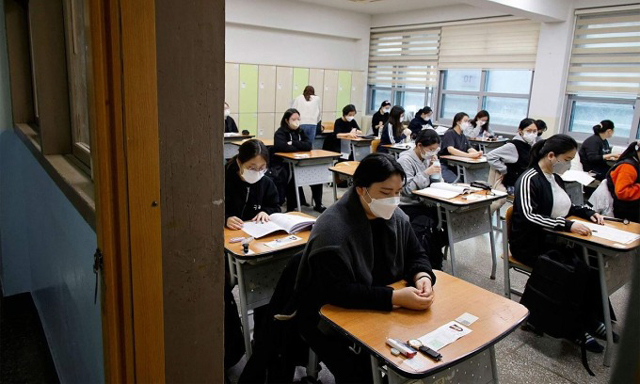
SEOUL, Nov 16, 2023 (BSS/AFP) - More than half a million students in South Korea are sitting the crucial national university entrance exam on Thursday, with authorities set to take extraordinary measures including halting flights to minimise distraction.
The nine-hour test, which is being taken by 504,588 pupils this year, is crucial for securing spots in top universities. It is also considered key to elevated social status, lucrative careers, and even marriage prospects.
The importance of the test, locally known as "suneung", is reflected in the aggressive measures that authorities take to prevent any disturbance.
To reduce noise disruption during the listening portion of the English test, Seoul's transportation ministry has announced a nationwide ban on all aircraft takeoffs and landings outside of emergency situations.
The ban will be in effect for 35 minutes, from 1:05 pm to 1:40 pm local time (0405 to 0440 GMT).
With the exception of aircraft in distress, all airborne planes must maintain an altitude higher than 3,000 metres (10,000 feet) during the restricted time.
More than 90 flights had to be rescheduled because of the exam.
Public offices and major businesses were requested to adjust their opening hours to 10 am or later to alleviate traffic congestion and ensure that students arrived on time for the nationwide exam, which commenced at 8:40 am.
The stock market also opened an hour later than usual.
For this year's exam, authorities dropped so-called "killer questions" -- which cannot be answered by simply studying the curriculum taught at public schools -- in a bid to reduce reliance on expensive private cram schools.
"In accordance with the Ministry of Education's measures to reduce private education, so-called 'killer questions' were excluded," Jeong Moon-seong, a university professor who supervised the exam's administration this year, told reporters Thursday morning.
"Questions of suitable difficulty were selected evenly to ensure that (students) can demonstrate their understanding based solely on the content covered in the public education curriculum," he added.
Enormous pressure placed on students in South Korea's ultra-competitive education system has been blamed for teenage depression and suicide rates that are among the highest in the world.
South Korean households spent more than $20 billion on private education for primary, middle and high school students last year, according to Statistics Korea.
The figure translates to an average monthly expenditure of $320 per student.
Police cars and regional government officials were on standby to help students running late for the exam reach their test sites in time.
This year's test also marks the first time that test-takers are writing the exam without wearing masks since the pandemic began.